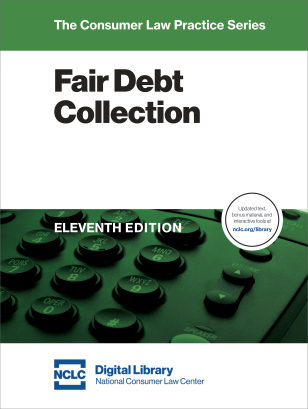As consumers get rid of their landlines, debt collectors are turning more and more to calling or texting consumers on their cell phones. Only one problem—federal law prohibits most such calls without the consumer’s prior express consent. As described in NCLC’s Fair Debt Collection § 8.3.2 (8th ed. 2014), recently updated online at www.nclc.org/library, the Telephone Consumer Protection Act (TCPA) outlaws most autodialed collection calls to cell phones, and offers minimum statutory damages of $500 per call. See Fair Debt Collection § 8.3.2.6.
Since most collectors will use similar means to contact thousands of consumers, class liability can be substantial. In addition, if the collector calls a cell phone after the consumer has asked the debt collector to cease communication, this should violate the Fair Debt Collection Practices Act, with statutory damages and attorney fees under that Act. See §8.3.2.1.
The debt collection industry asked the Federal Communications Commission (FCC) to loosen these restrictions, but after concerted consumer opposition, the FCC did the opposite—it added clarity to existing consumer protections. The FCC’s omnibus Declaratory Ruling and Order of July 10, 2015, makes it clear that autodialed calls to a cell phone violate the TCPA unless the caller has the prior express consent of the party it actually calls. Consent by the person to whom a cell phone number was previously assigned is insufficient. See § 8.3.2.1. This applies to wrong-number debt collection robocalls (with a limited exception for the first call if the number was reassigned from a consumer who had given prior express consent). See § 8.3.2.4.3.
The burden is on the collector to show express consent to the communication, and the FCC advises callers to have adequate business records to show that consent. See § 8.3.2.5. The new FCC ruling also clarifies that debtors have the right to withdraw any consent they have given to receive robocalls on their cell phones, and can do so through any reasonable means, including oral notification. See §§ 8.3.2.4.2, 8.3.2.4.4.
The prohibitions on calling and texting cell phones without prior express consent apply to automatic dialing systems. The new FCC order reiterates its previous rulings that automatic dialing systems include predictive dialing systems that make calls from lists of specific phone numbers, using algorithms that predict when a consumer will answer the phone and when a telemarketer or debt collector will be available to take the call if it is answered. See § 8.3.2.3.
The new FCC order creates two narrow exemptions for certain free-to-end-user calls by financial institutions and health care providers about topics such as fraudulent transactions or home health care instructions. Neither of these exceptions applies to debt collection calls. See § 8.3.2.4.1.


